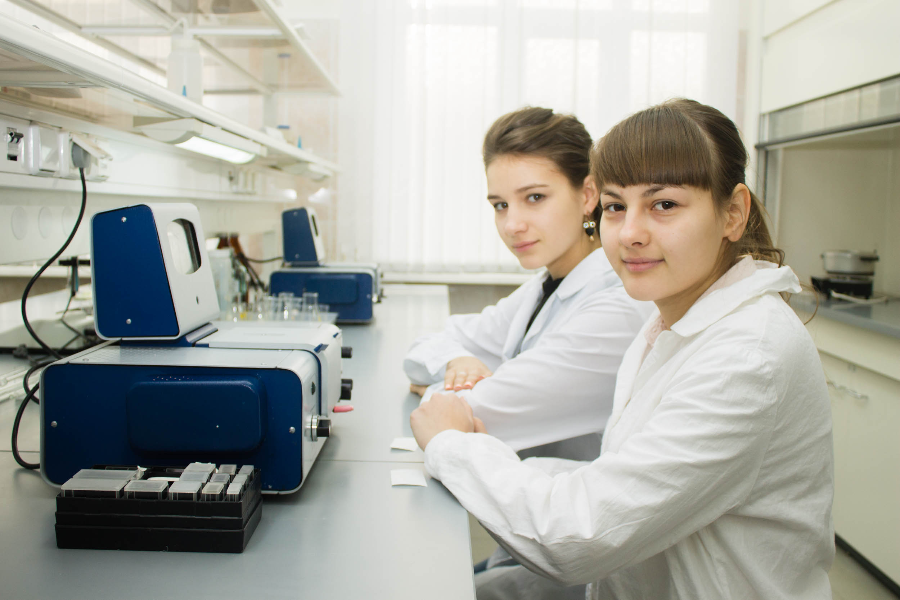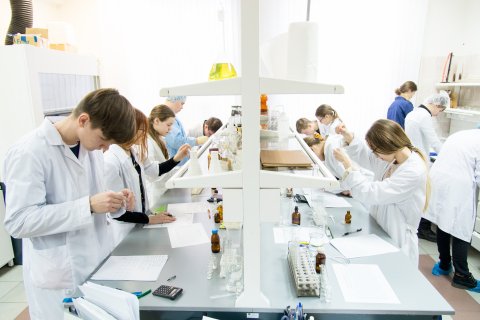For many centuries now, people have been fascinated by studying chemistry, since it is the only way to understand the mechanisms of how the world around us works. Chemistry makes it possible to produce medicines and cosmetics, invent new methods of treatment and obtaining of materials. This science is of real value for society due to the fact that not a single modern technology can function without it. For a chemist to be successful, it is necessary to always try to learn new things, because chemistry is considered to be one of the most rapidly developing sciences, in which it is important to keep track of new methods, techniques, that is, to be aware of state-of-the-art scientific trends.
Moreover, the profession requires specific personal qualities, namely perseverance, patience, observation skills and the ability to think critically. It is important to notice, analyze and organize new information.
According to Professor, Doctor of Sciences (Chemistry), Head of the Department of Theoretical and Applied Chemistry Оlga Sharutina the Chemistry programme is a classical one, that provides fundamental training in all fields of chemistry.
How Classes in Chemistry Are Held, and What Useful and Interesting Things the Future Chemists Study
In 2020, 25 state-funded places were offered in the full-time Chemistry programme of the Department of Theoretical and Applied Chemistry.
Traditionally, the first semester begins with an inspiring-for-research introduction to the history of science, as well as with “inorganics”, the training in which lasts two semesters. Then, students take courses in analytical, physical, colloidal, organic, quantum, biological and organoelemental chemistry.
At SUSU, new programs and laboratories for acquiring practical skills while training as highly qualified specialists in the field of chemistry were created. Thus, one of the main advantages of studying at the SUSU Department of Chemistry is an extensive laboratory practice, which allows to gain experience in working with various equipment. Students learn not only to perform synthesis, but also to assess possible risks, and predict side processes that can affect the yield of the reaction product.
Studying for a Bachelor’s degree, students actively participate in scientific research, prepare a number of joint scientific publications together with academics, and successfully give speeches at conferences of different topics. And studying the discipline of Chemistry in English for four years provides graduates with a capability to read and understand literature in the English language, as well as translate their articles for publication in English-language sources.
Students of the Department of Theoretical and Applied Chemistry have a chance to conduct research work in modern laboratories. In total, the department has four big research groups, which are engaged in scientific activities. Below is the detailed information about each of those.
Employment of Graduates
Students take their practical training not only at the laboratories of the university, but also at production, where they can get a job after graduation.
Graduates of the Department of Theoretical and Applied Chemistry are in demand in laboratories of chemical, food, metallurgical, pharmaceutical, petrochemical, mining, and gas production industries. In addition, they can build their career in science: highly qualified chemists are in demand in various scientific centres for research in the field of chemistry, biochemistry, geochemistry, petrochemistry, ecology, and pharmacology. Many graduates dream of connecting their future with forensic science, and training in the Chemistry programme can help with that.
Organic chemistry plays a central role in our ability to solve problems in medicine, power sector and technology.
Researches in the field of organic chemistry of the SUSU Department of Theoretical and Applied Chemistry are working on creating new heterocyclic systems as promising biologically active substances that modern medicines are based on.
Over 12 years, five members of the team have successfully defended their candidate’s theses. The members of the scientific school regularly achieve high results in various competitions and publish the obtained results in journals indexed in Scopus and Web of Science databases. The SUSU scientific school of organic chemistry researches is headed by Dmitry Kim.

Organoelemental Chemistry, which Originated at the Junction of Traditional Inorganic and Organic Chemistry, Is a Relatively “Young” Science, but One That Has Already Entered Many Spheres of Human Life
Organoelemental researches of the SUSU Department of Theoretical and Applied Chemistry are developing methods of directed synthesis of organoelemental compounds with practically significant properties.
Next year, the team of the scientific school will be celebrating its 10th anniversary of scientific work at SUSU, over the years of which the research process has been intensively conducted together with students, Master’s degree students, postgraduate students and doctoral students.
The SUSU scientific school of organoelemental chemistry researches is headed by Vladimir Sharutin. Nowadays, such scientific subdivisions as laboratories of chemistry of organoelemental compounds and X-ray structural analysis are effectively working under his leadership. The Scopus database contains about 300 scientific publications of Vladimir Sharutin.

Supercomputer Simulation of Chemical Processes and Compounds Allows to Make the Process of Creating Useful Materials with the Required Properties More Effective
The researchers of the scientific school under the leadership of Ekaterina Bartashevich are working on developing methods for multiscale (from subatomic to macro-object) supercomputer modelling. The field of the scientific research of the laboratory is related to the development and improvement of the efficiency of optically active materials based on multiscale modelling of properties.
The staff members of the laboratory actively participate in international symposia with reports, and also regularly publish materials in journals indexed in Web of Science. To conduct research, the laboratory scientists use the SUSU Tornado, the university's most powerful supercomputer.

Electrochemistry, Based on the Mutual Transformations of Chemical and Electrical Energy, Is of Great Practical Importance, and That Has Made It an Independent Branch of Science
Electrochemists study metals, alloys and carbon materials using electrochemical methods.
Due to the increase in the share of electrochemical technologies in industry, studies of the regularities of anode processes are of great practical importance for electrotyping, hydrometallurgy, electrochemical dimensional processing, the manufacture of chemical current sources, condensers, and for other fields.
The SUSU scientific school of electrochemists is headed by Ekaterina Sharlai. Over the years of the team’s scientific work, the results have been presented at various international conferences, and materials are regularly published in journals indexed in Scopus and Web of Science.




